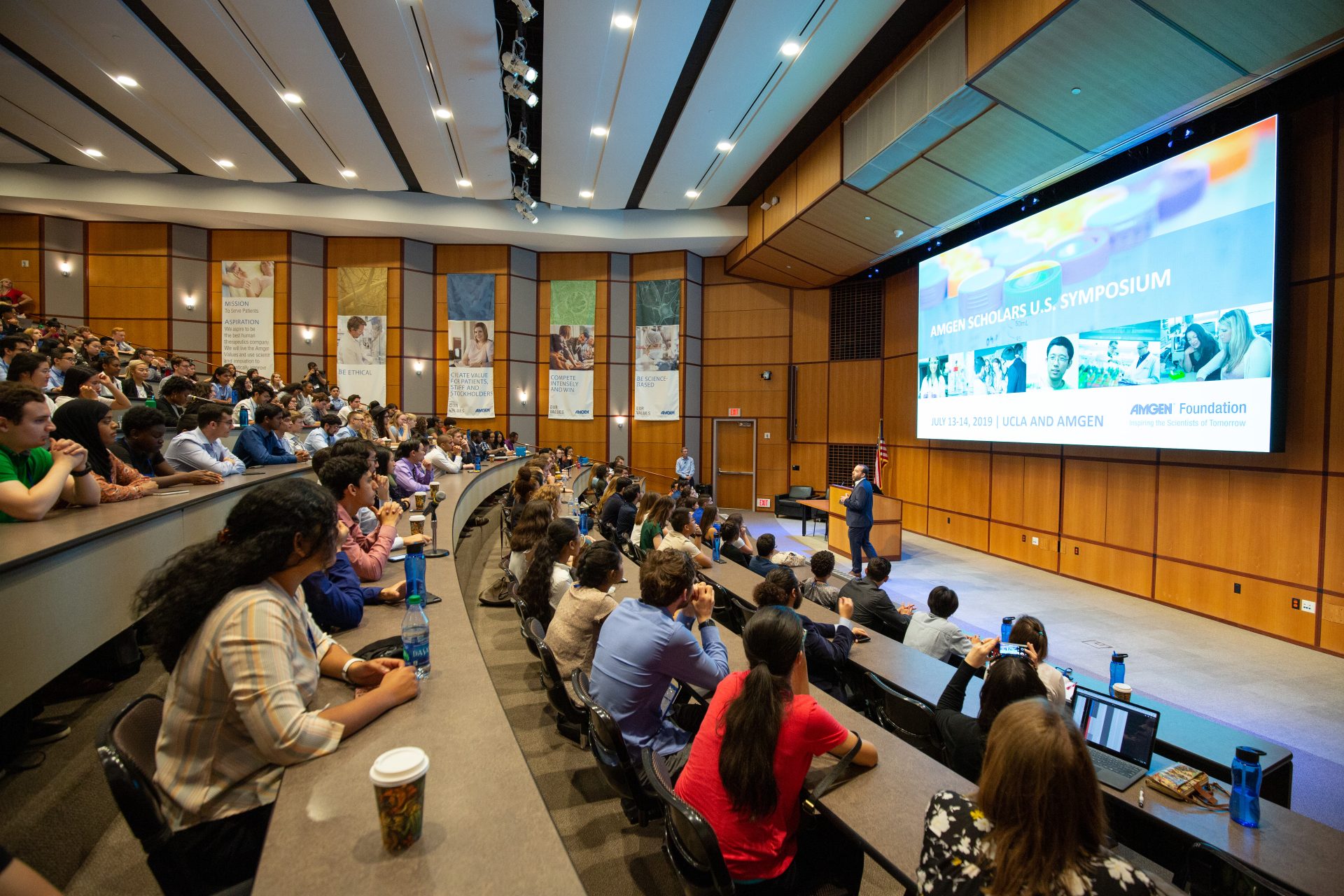Blog
A Case Study In Driving Growth Through Activism

This is the sixth post in a series of interviews with impact-driven corporate leaders. Interviews were conducted around the Los Angeles Social Innovation Summit. At the Summit, entrepreneurs, philanthropists, purposeful brand owners, and individuals gather to share challenges and breakthroughs in the social good space. For this article, I spoke with Eduardo Cetlin, President of the Amgen Foundation.
Amgen is one of the world’s largest biopharmaceutical companies. With over 40 years in the business, Amgen’s mission is “to serve patients.” One of the ways Amgen serves is by democratizing science education and literacy.
“We are reliant on a highly skilled workforce. We're also reliant on a scientific-literate society.” Cetlin tells We First. The Amgen Foundation works in these areas to provide innovative educational opportunities.
“The way kids experience school today is very similar to about a hundred years ago. Typically, teachers talk and students listen,” Cetlin says. “Kids say they like science, but they think science class is boring. Unless we engage and create opportunities for them to become active learners in the classroom, we'll be in trouble as a broader society.”
What’s more, teachers often lack the resources and support they need to effectively teach students science.
“In a great book called Most Likely to Succeed the authors share a valuable analogy: if we were to think about how you teach a child to ride a bicycle in a classroom, this is what we're going to do. We spend one week on the history of the bicycle, another talking about all the individual parts of the bicycle. Then you watch some videos. Then, if you are lucky, you will learn about balance in a physics class. Finally, I'm going to give you a diploma, and I expect you to ride your bike out of here,” Cetlin shares.
“The best way students can learn science is to do science.” The Foundation started Amgen Biotech Experience. During the experience, "high school students get to transform a bacterial cell into a protein factory. We train the teachers and provide the professional-grade equipment for the students,” Eduardo explains. “They use the same kind of technology that a company like Amgen will use to make a protein such as patients’ erythropoietin or insulin.”
Cetlin estimates around 85,000 high school students globally benefited from the Amgen Biotech Experience. Another way Amgen supports science education, at the collegiate-level, is through Amgen Scholars.
The summer research program offers 360 students from Europe, Asia and the US, an all-expenses paid opportunity to work at a top tier research laboratory. In its 13th year, Amgen has invested nearly $75 million in the project. “It's one of the most competitive programs in the world, nearly 10,000 applicants apply for these 360 spots.” Cetlin says.
One of the challenges with spreading scientific literacy is scale. This is especially important for scientific literacy. To address the issue of scale, Amgen is partnering with and investing in projects that take learning online.
“We financed the entire suite of biology content for the Khan Academy. They went from having 350,000 to 3.5M million users a month and growing. The other part is the way they partner with the schools. They partner with the teachers to take this free content and make it a part of the day-to-day for all their students.”
“We're also launching something called LabXchange with Harvard University this fall. LabXchange will be a virtual laboratory to get students to think like scientists.
“LabXchange is going to take all sorts of assets like MOOC courses, break them down and tag them into individual pieces. Then they're going to create special sequences for teachers to create opportunities for new students that leverage cutting-edge information. They can bring a video. They can bring an experiment, a simulation.”
Essentially, LabXchange will make it easy to customize education. The program will put cutting edge virtual resources at students and teachers’ fingertips.
While investing in scientific literacy is a nice thing to do, how does it help Amgen’s business? Amgen Foundation’s president says that while some program participants might turn around and work for the company, it’s about investing in society. “Our population needs to be in a position to deal with the complexities of the modern world. If you're sick and you've got to navigate the healthcare system, it's really hard.” What’s more, “If these students stay in biopharmaceutical companies, if they stay in research, it's a win for everyone.”
“We’ve worked with the folks at Keck Graduate Institute to create two new masters in human genetics. One is on genetic counseling, and one is on genomics data analytics. These jobs are just beginning to exist. We are at the forefront of creating career opportunities, all the way from high school to the graduate level and professional school to thrive in this world,” Cetlin enthuses.
In other words, Amgen is leveraging its social good initiatives to spark innovation in biotech and the medical workforce. Amgen’s purposeful programs also provide employees with a way to give back.
Take the Amgen Biotech Experience program, for example. "We recently launched a pilot where we recruit Amgen staff to go into these classrooms. When the students are using a professional-grade micropipette, and thinking about the bacterial cell, some of them think, ‘Yes, I want to be a scientist!’ Some of them are also saying, ‘This is cool, but I will never be a scientist.’ So, what do we do?”
“We bring people from HR. We bring people from finance. We bring people from law. We bring people from all other walks of Amgen to talk about what it takes for a medical biotech corporation to be successful. We need all sorts of different talents, and who best to tell that story? Our staff.”
Amgen’s purpose helps attract and retain talent. “Somebody that comes and joins Amgen with a postdoc has made a career choice over a decade. They've invested a decade, and we're thrilled to have them come work for us in helping save lives. I say, ‘Don't go to Amazon, come to Amgen, come save lives,’” Cetlin says.
Amgen is invested in building scientifically informed citizens and the workforce that can develop the best biologically-driven medicine for them. By helping the world become more scientifically literate, Amgen builds a culture and community that better understands and values its products and services.

A Case Study In Driving Growth Through Activism
Why and How to Become a B Corp

Purpose At Work: 10 Brands Leading With Purpose In 2019

